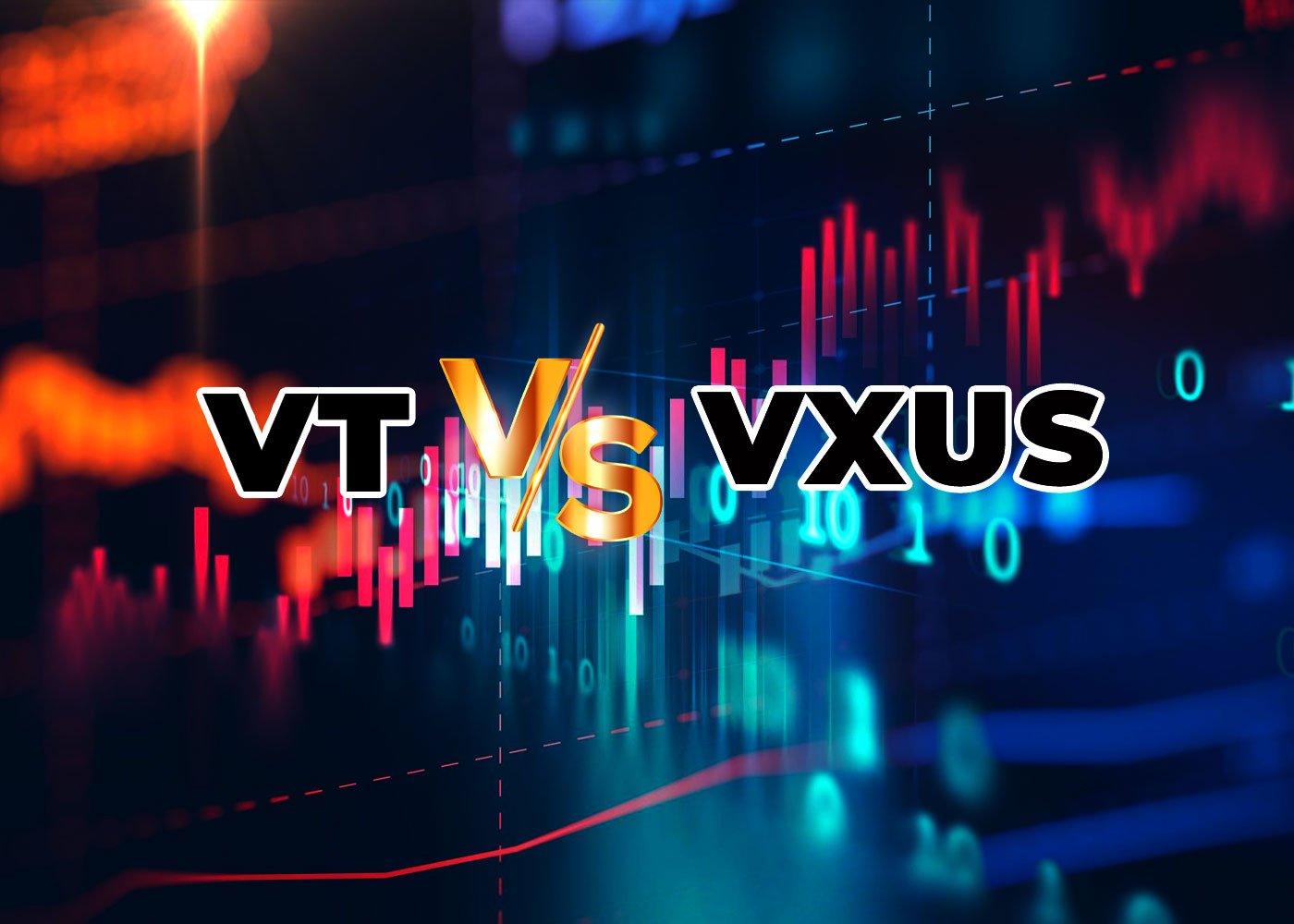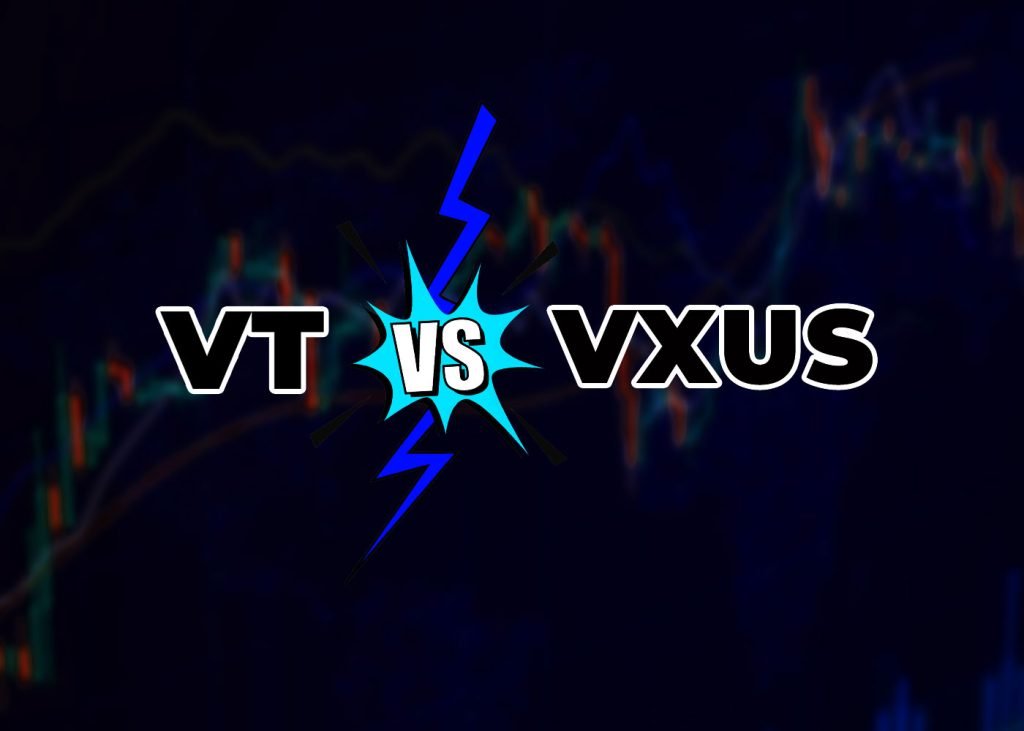
Are you looking for the ideal investment to put your hard-earned money into? It can be a daunting task to decide between two leading market index funds, VT and VXUS. Both offer broad-based exposure across multiple asset classes, efficiently giving investors access to global markets. In this blog post, we will look at the features of both funds, such as costs and risk profiles, allowing you to make an informed decision about which fund is the better choice for your personal financial goals.
VT: Overview, Pros, and Cons
The VT is a widely used abbreviation for the Vanguard Total World Stock ETF. This ETF invests in a broad range of stocks worldwide, including both developed and emerging markets. It aims to match the performance of the FTSE Global All Cap Index, which has over 9,000 stocks from 48 countries. Vanguard launched the VT in 2008, and it has grown to be one of the world’s largest ETFs, with assets over $26 billion as of April 2023. The VT is designed to be a cost-effective option for investors looking to trade in global equities.
Pros:
- Broad Diversification: Investors can gain exposure to a broad selection of stocks in both developed and emerging global markets through VT. This diversification may aid in mitigating portfolio risk and potentially enhance long-term returns.
- Low Expenses: The expense ratio for VT is only 0.08%, which is much less than the typical expense ratio for mutual funds that are actively managed. This could assist investors in retaining more of their profits and potentially enhancing their overall outcomes over time.
- Easy to Buy and Sell: VT is an ETF that can be bought and sold like a stock on an exchange, which means investors can easily trade shares anytime during market hours.
Cons:
- Market Risk: The value of the fund holdings in VT can decrease due to factors such as company-specific issues, economic conditions, or geopolitical events because it is subject to market risk.
- Lack of Customization: Investors who choose to invest in VT may be unable to select specific sectors or companies to invest in, as it invests in a wide variety of stocks. This lack of customization may not suit investors who wish to focus on particular sectors or companies.
- Limited Control over Tax Consequences: Investors should know that as an ETF, VT may distribute capital gains to its shareholders, leading to potential tax implications. However, it’s important to note that investors have little control over when or how much these distributions will occur.

VXUS: Overview, Pros, and Cons
Vanguard Total International Stock ETF is referred to as VXUS. This ETF invests in various international stocks, except for the US. Its objective is to follow the FTSE Global All Cap ex US Index, which contains over 7,000 stocks from numerous regions such as Europe, Asia, Canada, and emerging markets. Vanguard launched VXUS in 2011, which has gained popularity among investors aiming for international equity exposure. This ETF is intended to offer investors inexpensive ways to invest in non-U.S. equity markets.
Pros:
- Broad Diversification: Investors can gain broad exposure to international stocks across developed and emerging markets by investing in VXUS. Such diversification can help lower portfolio risk and potentially enhance long-term returns.
- Low Expenses: Investors can save more of their returns and potentially improve their long-term outcomes by choosing VXUS, which has an expense ratio of only 0.06%, far lower than the average expense ratio of actively managed mutual funds.
- Currency Diversification: By investing in VXUS, you can effectively diversify your currency holdings and potentially lower your currency risk as the fund invests in stocks from different currencies.
Cons:
- Market Risk: The value of the holdings of the VXUS fund can decrease due to various factors such as economic conditions, geopolitical events, and company-specific issues. This is because VXUS is exposed to market risk.
- Limited Exposure to the U.S. Market: Investors who only invest in VXUS, which doesn’t include U.S. stocks, may not benefit from investing in the U.S. market.
- Limited Control over Tax Consequences: VXUS, being an ETF, might distribute capital gains to its shareholders. This could potentially result in tax implications for investors, but they have no significant control over the size or timing of these distributions.
Let’s Help You Choose:
Here’s a brief comparison of VT and VXUS:
- Geographic Coverage: VT invests in both U.S. and international stocks, while VXUS invests only in international stocks except those in the U.S. market.
- Diversification: VT and VXUS diversify by investing in multiple stocks and markets, but VT offers broader exposure to worldwide equity markets than VXUS.
- Expense Ratio: Investors who want to save money on investments may be interested in VT and VXUS because of their low expense ratios. VT has an expense ratio of 0.07%, while VXUS has a slightly lower ratio of 0.06%.
- Currency Risk: Investors can benefit from diversification and potentially reduce currency risk by investing in the VXUS fund, which focuses on stocks that use a variety of currencies. However, investing in the VT fund, which is reliant on U.S. dollar investments, may be influenced by currency risk.
- Investment Objective: If you’re looking to invest in various global equity markets, VT may be the best choice. However, if you want to diversify your portfolio by investing in international equity markets that are not based in the US, VXUS may be more suitable.
Your decision between VT and VXUS should be based on your investment goals, willingness to take risks, and investing approach. If you prefer comprehensive coverage of the U.S. and global stock markets, VT could be a more fitting option. On the other hand, if your focus is solely on non-U.S. international equity markets, VXUS may be more appropriate. Nevertheless, both ETFs are dependable options for investors looking for cost-effective and diversified exposure to worldwide equity markets.
Final Words:
To summarize, Vanguard offers two affordable ETFs called VT and VXUS. These funds give investors broad diversification across global equity markets. VT covers both U.S. and international equity markets, while VXUS focuses only on international stocks outside the U.S. Both ETFs have a low expense ratio and offer a convenient and cost-effective way for investors to access global equity markets. Choosing between VT and VXUS comes down to your investment goals, how much risk you can handle, and your investment plan. However, these ETFs are reliable options for those who want affordable, well-diversified access to worldwide equity markets.






